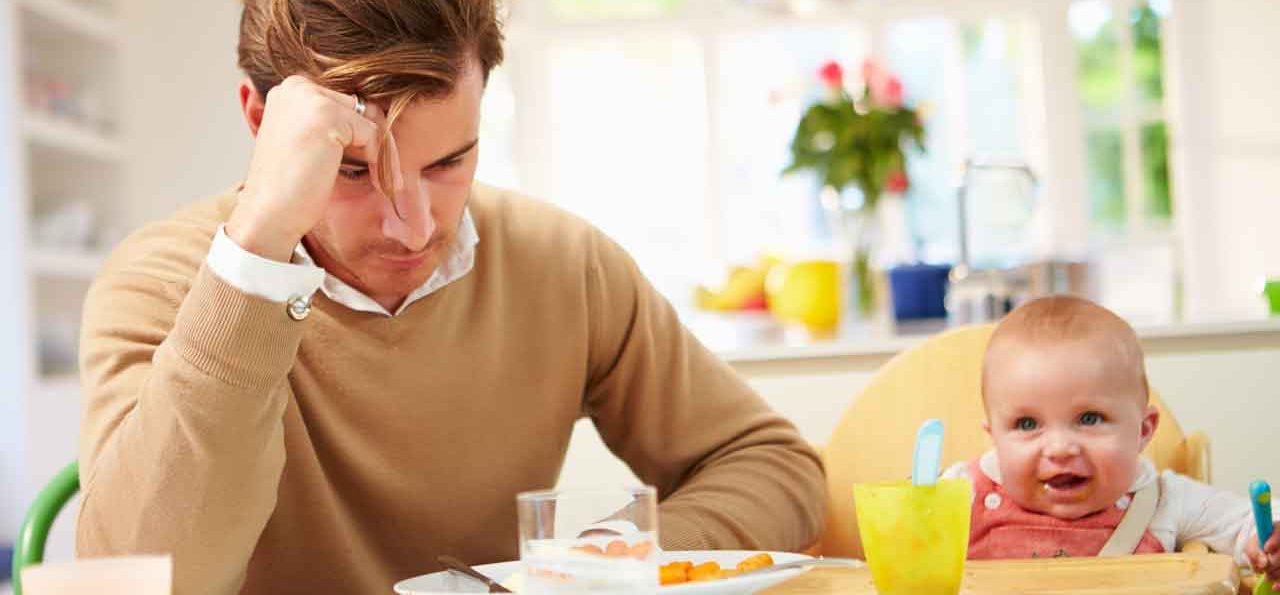What Is Male Postpartum Depression?

What is male pospartum depression? Most mothers experience some baby blues, nearly a quarter before or after birth. But few people know that postpartum depression can also affect fathers.
An adorable bundle of new life arrives in your home — and you’re miserable. How can that be?
It’s hard to admit — but not so hard to understand. New parents go without sleep and face an enormous change in their lives, especially with a first child. They also experience hormonal changes that can cause a devastating drop in mood and energy. Most mothers experience some “baby blues” and nearly a quarter descend into depression before or after birth. But few people know that postpartum depression can affect fathers as well.
Yet male postpartum depression may be quite common. How common isn’t quite clear because studies have used different ways to define the problem. Reported rates of depression in new dads range from 1 percent to 25 percent. In 2010, a meta-analysis reviewed 43 studies of a total of more than 28,000 fathers and concluded that, on average, in the United States 14 percent suffered from depression sometime between the first trimester of their partner's pregnancy and the child's first birthday.
Rates of male postpartum depression peaked at 25.6 percent at three to six months after birth. At nine months out, a 2017 study of more than 3,500 new fathers in New Zealand found that more than four percent were extremely depressed.
YOU MIGHT ALSO LIKE: Can You Reverse Erectile Dysfunction?
What is male postpartum depression?
It may sound strange to say that men experience hormonal changes; after all, they haven’t given birth. But our bodies respond to our circumstances. In a 2006 study on marmoset monkeys, researchers found a rapid increase in receptors for the hormone vasopressin in the brain in new fathers. Vasopressin is a male bonding chemical. There is also some evidence that testosterone levels tend to drop in men during a partner’s pregnancy. In middle-aged men, low testosterone is associated with depression and the drop may affect younger men.
Men are most vulnerable if the mother is depressed, and the couple will need help from outside, since it’ll be harder for him to step up and support Mom. Male postpartum depression is also more likely in men who have other health problems or are unemployed. Men are at risk if the couple experience lots of conflict or have separated. An unexpected pregnancy or disappointment in the baby’s gender can be factors.
Men typically worry about the cost of raising a child or fear that their wives will lose interest in them, as childcare fills up the day and chores take over their lives.
Male postmartum depression symptoms
The signs of depression in men (and signs of postpartum depression) include feelings of sadness and emptiness, a sense of failure, a desire to withdraw from family and friends, and thoughts of suicide. Depressed women are also sad and withdrawn, but men are more likely to also become irritable, hostile, and aggressive. Or they may be strangely detached. They may be less likely to seek help or confide how they are feeling, and try to focus on helping the mother and care for the baby.
But seeking help is important. Like mothers, fathers need to understand that treating their condition isn’t selfish or self-indulgent — it’s necessary for the well-being of the mother, new baby, and any siblings. When either parent is depressed, young children will feel the effects; depressed parents, for example, are less likely to talk to their children, sing to them, or read them stories. When fathers are depressed and withdraw from infants, the children have smaller vocabularies than other children do by 24 months. Depressed Dads are also more likely to spank even one-year-olds. One study linked male postpartum depression to behavioral problems in children, especially boys, at age three and a half, and a psychiatric diagnosis at age seven.
Are you depressed?
Use this checklist to evaluate whether you (or a new father you care about) should speak to a counsellor or psychiatrist.
- Have you lost your appetite or become hungry all the time?
- Are you drinking more or using drugs?
- Do you have more aches and pains?
- Do you want to withdraw from social activities?
- Do you feel trapped? Angry? Hopeless about the future?
- Does it cross your mind that your baby and your baby’s mother deserve a better man than you or would be better off without you?
Treatment
The treatment for male postpartum depression can include the range of remedies for depression: medication, talk therapy, and more exercise as well as changes in diet. You may need to get more childcare help in order to catch up on sleep and exercise.
Updated:
February 27, 2020
Reviewed By:
Christopher Nystuen, MD, MBA